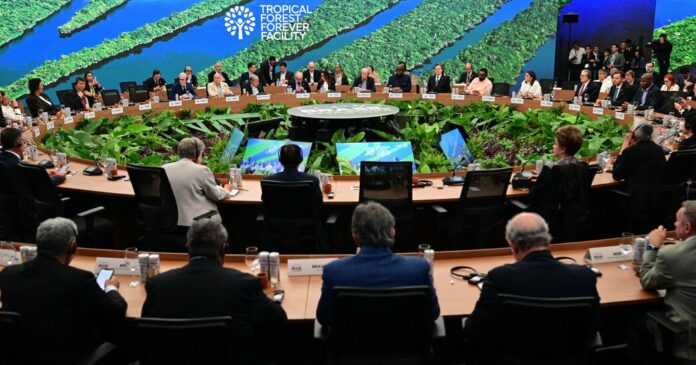A global climate summit convened in Belém, Brazil – a city nestled on the fragile edge of the Amazon rainforest – underscored an urgent reality: slowing down global warming is no longer just an environmental imperative, but a necessity for economic growth and energy security. This stark message emerged amidst a backdrop of international discord and escalating climate-fueled disasters.
The absence of senior U.S. officials at this gathering was particularly telling. While President Trump has publicly dismissed climate change as a “con job,” actively undermining global efforts to transition away from fossil fuels, leaders from around the world rallied behind a different vision. Notably absent were any representatives from the U.S., which withdrew from the landmark Paris Agreement under the previous administration.
The summit took place against a turbulent global backdrop. International cooperation is strained by war and trade disputes, pushing up prices for essential goods. Simultaneously, extreme weather events exacerbated by fossil fuel emissions are intensifying human suffering. Recent weeks have witnessed devastating storms and hurricanes in Mexico, Jamaica, and Haiti – stark reminders of the escalating climate crisis.
Addressing the assembled leaders, UN Secretary-General António Guterres issued a blunt call to action. He condemned both the fossil fuel industry and those governments “captive” to its interests, urging them to prioritize the public good over short-term profits. This direct criticism underscored the frustration felt by many world leaders at the glacial pace of global climate action.
The summit’s diverse roster included representatives from large and small nations alike – both industrialized economies and rapidly developing ones. Their message resonated with a sense of urgency: addressing climate change is not just an environmental matter, but also vital for national security, economic competitiveness, and public health.
Examples of this multifaceted argument came from prominent figures on the global stage. British Prime Minister Keir Starmer emphasized how homegrown energy sources – wind and nuclear power in Britain’s case – could grant nations independence from volatile energy suppliers like Russia. However, he also acknowledged the ongoing struggle to keep electricity prices affordable amidst rapid expansion of renewables.
Prince William, heir to the British throne, painted a picture of opportunity, highlighting how climate action can catalyze job creation and drive innovation in cleaner technologies: “It’s a profound opportunity to build a cleaner economy,” he stated.
China’s Vice Premier Ding Xuexiang championed China’s own path toward “green and low carbon development” as a means of stimulating economic growth and generating new employment opportunities. Notably, he appealed for removing trade barriers to ensure the smooth flow of clean energy technologies – a clear nod to China’s dominance in this sector and its ambition to export solutions to developing nations.
Brazil’s President Luiz Inácio Lula da Silva framed climate action within the context of safeguarding the Amazon rainforest and its indigenous communities. He positioned the summit as a moment for global accountability: “It is the time for the people of the Amazon to ask what is being done by the rest of the world to avoid the collapse of their house,” he declared.
However, Lula’s commitment to climate action remained somewhat compromised by recent decisions. Just weeks before the summit, he authorized oil drilling in the Amazon basin, and despite efforts to reduce deforestation rates during his presidency, soybean cultivation – driven largely by demand from China – has continued to decimate vital ecosystems like the Cerrado.
This 30th anniversary gathering of global climate diplomacy came a decade after the landmark Paris Agreement, which called for increasingly ambitious emissions reduction targets from all nations and pledged financial support from wealthier countries to assist developing nations in their transition away from fossil fuels.
Unfortunately, progress has fallen far short of expectations. Scientists now warn that exceeding the 1.5 degrees Celsius (2.7 degrees Fahrenheit) warming threshold – a limit considered crucial to avoiding the worst impacts of climate change – is virtually certain. This means global emissions must be nearly halved between 2019 and 2030, a goal nations have failed to approach. Current policies suggest we are headed toward closer to 2.7 degrees Celsius of warming.
“The hard truth is that we have failed to ensure we remain below 1.5 degrees,” Guterres stated unequivocally. “This is moral failure and deadly negligence.”
Despite these grim realities, the summit also showcased a paradoxical reality: renewable energy technologies and electric vehicles are steadily gaining traction in both developed and developing nations – though not nearly fast enough to meet even moderate climate targets. This suggests that while political will remains fragmented, technological solutions and growing public awareness are slowly but surely reshaping the global landscape.
